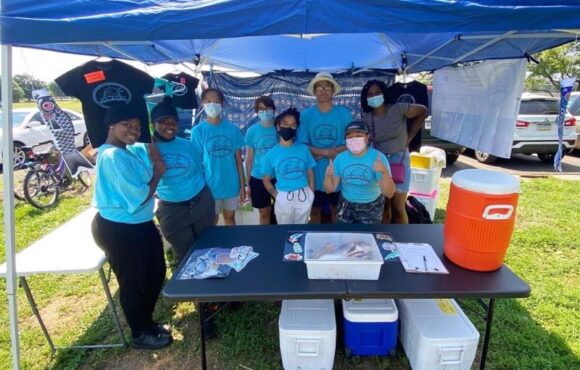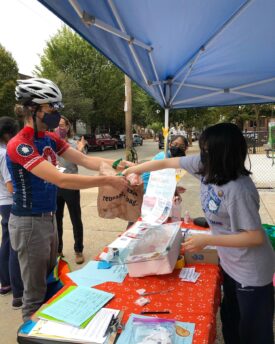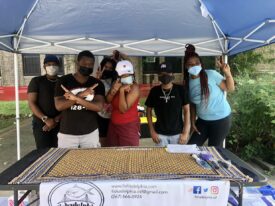Talia Young GSNB’16 (Ecology and Evolution) started the “Fishadelphia” program in 2018 after earning her doctoral degree in Ecology with former Rutgers marine and coastal sciences professor Olaf Jensen. Currently, Young is a visiting assistant professor at Haverford College in the environmental sciences program. This article has been excerpted from High School Students Bring Seafood to Low-Income Consumers | NOAA Fisheries. In addition to being an alumna, Young is co-PI with assistant extension specialist Cara Cuite from the Department of Human Ecology on a New Jersey Sea Grant-funded research project being run through Rutgers Cooperative Extension. This three-year grant has provided funding to expand the Fishadelphia program into new markets.
Fishadelphia is a pilot community seafood program based in Philadelphia. It was awarded a NOAA Fisheries Saltonstall-Kennedy Grant designed to connect seafood to low-income consumers.
What is Fishadelphia?
Based in Philadelphia, Fishadelphia is a pilot community seafood program that was awarded a Saltonstall-Kennedy (S-K) Grant in 2020. It was designed to connect low-income consumers in Northern Philadelphia with neighboring New Jersey harvesters. This project promotes improved business practices, increased market demand for U.S. commercial fish species, and keeping working waterfronts viable.
Grants are critical to the fishing industry. Traditional funding can be hard to obtain for smaller seafood programs, but that’s where the S-K program can help. These grants help bridge that gap and support projects that are outside of the mainstream lending arena.
Since 1980, the S-K Grants program has helped turn ideas into reality. In 2018, Dr. Talia Young started this project while a Smith Conservation Postdoctoral Fellow at Princeton University. Her goal was to connect the fishing communities with the eating communities in the city.
“This is a cool project and one that I’m happy to highlight because it supports community participation that contributes to the promotion of U.S. seafood. This provides fresh seafood to underserved communities, and increases the customer base for our working waterfronts, which aligns with the goals of the S-K grant program,” said Nicole MacDonald, Regional S-K Grant Manager at the Greater Atlantic Regional Fisheries Office.
Take a Closer Look
Fishadelphia in essence is a de facto retail fish market with students running the show. The whole idea is to make new connections by promoting, developing, and marketing local seafood to low-income people of color. The diverse team consists of middle school, high school, and college students, family, teachers, seafood harvesters, and marine biologists. The program is creative and paves the way for expansion. It serves as a model for other communities struggling to incorporate healthy seafood into their diets. It’s not surprising MacDonald thinks that this project is “cool”—because it is.
How Does it Work?
George Mathis is a third-generation New Jersey bayman and member of the Heritage Shellfish Cooperative. Mr. Mathis helped to initiate Fishadelphia with his many connections in the seafood industry. He is in charge of purchasing the fish and bringing it to the city. He’s the guy on the supply side of the equation. He trucks dozens of varieties of seafood from local New Jersey fish houses and processors, and from several independent fishermen. These companies have also hosted tours of their facilities to provide the students hands-on experience. They include:
- Lunds Seafood in Cape May
- Viking Village in Barnegat Light
- Fishermen’s Dock Cooperative in Point Pleasant
- Randall’s Seafood and Maxwell Seafood
- Sweet Amalia Oyster Farm
The demand side is where the high school comes in. Twice a week, after the bell rings, Mastery Charter Gratz Campus in North Philadelphia turns into a business incubator in the form of a retail fish market. Students turn into entrepreneurs and run the show. They are crucial to the process because they help break down traditional language barriers. They produce flyers and other outreach materials in several languages, making ordering and the entire process easier. Most of these students will be the first in their families to ever attend college. “I’m proud [of all of Fishadelphia’s] accomplishments as a whole. Being a small business isn’t easy. Everyone is involved in the process 100 percent,” said Cory Sengendo, a student at Gratz.
Connections Travel in Both Directions
Harvesters and processors also have a lot to learn and gain in terms of market share and using a high school helps to penetrate these barriers. It’s an ongoing, two-way educational process on many fronts. Fishadelphia is teaching high school students leadership and entrepreneurial skills, while the neighborhoods are getting high-quality seafood at reasonable rates.
Aside from breaking down the language barriers, the Supplemental Nutrition Assistance Program is also available to bridge the financial gap. A lack of funds often forces consumers to opt for a less diverse and nutritional diet. Forty percent of Fishadelphia consumers receive a discount which is evidence that the program is working. The word is out that you can use your SNAP benefits at Fishadelphia and increasingly more at farmers’ markets.
Originally, Fishadelphia intended to target restaurants. The program sought to become a full-scale wholesaler that served restaurants in addition to establishing an independent fish market to individual consumers. However, like everything else, the COVID-19 pandemic has made people and industries adapt—Fishadelphia is no exception. However, they have supplemented their summer and fall marketing approach by switching to outdoor, more COVID-safe, farmers’ markets.
More to Come for Fishadelphia
Fishadelphia also has plans to create a video showing the entire process of their operation from start to finish—From Sea to Plate. And it doesn’t stop there. A cookbook is also in the works featuring ethnically diverse recipes in multiple languages.
Despite the pandemic’s challenges, Fishadelphia, is accomplishing everything it has set out to do. It’s promoting, marketing, and developing a blueprint to connect low-income people of color with local harvesters for others to follow, and scalability for itself. “Fishadelphia feels like home. The environment is so inviting, and we’re like a family. COVID affected us, but we bounced back. Our business has actually improved. I want to run my own business, and I’m learning things about what is needed to run that business,” said Zakheem Lindsay-Moore, a 2019 graduate from Simon Gratz Mastery Charter school.




